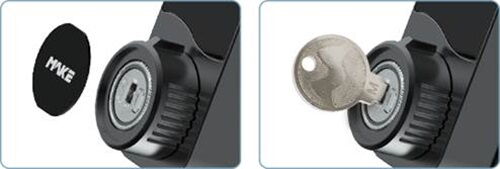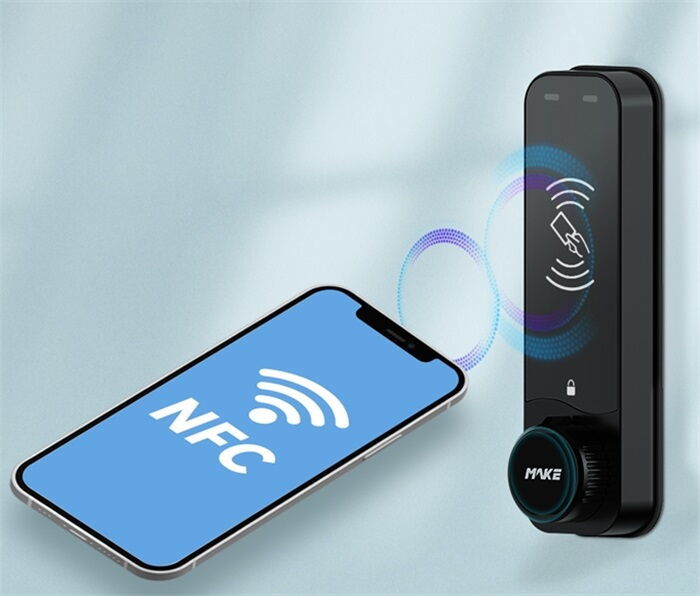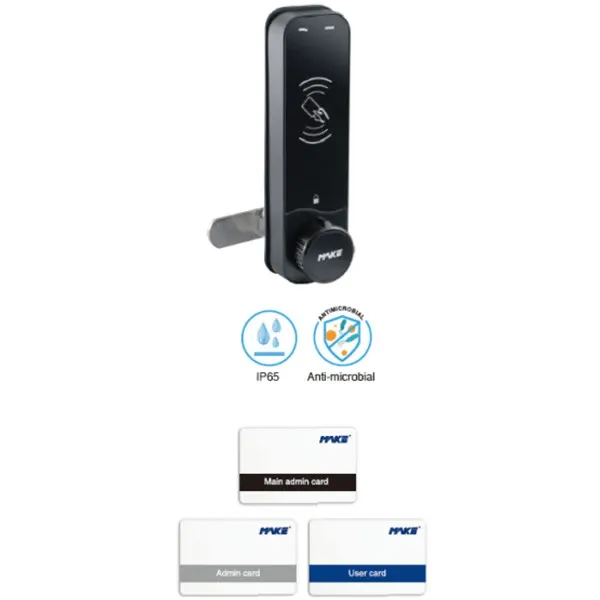In the rapidly evolving world of smart security, RFID electronic locks have become an indispensable solution for locker and cabinet management across various industries. From fitness centers and swimming pools to schools, hospitals, and office facilities, these locks offer a modern alternative to traditional mechanical locks that require turning a key multiple times to open.
At the heart of this shift is the convenience factor: RFID electronic locks enable quick, contactless access using IC cards or wristbands, significantly improving user experience while reducing maintenance issues associated with lost or worn keys. However, as user expectations grow and new use scenarios emerge, the technology behind these locks must keep up.
This is where MAKE’s latest innovation, the MK729 RFID Electronic Lock, stands out. Building on years of research and refinement, MAKE has introduced a next-generation solution that doesn’t just replicate what existing RFID locks can do — it adds thoughtful upgrades that address real user pain points and anticipate future needs.
So, what makes the MK729 different? Let’s take a closer look at three standout features that set it apart from traditional RFID electronic locks on the market.
Before diving into the unique advantages of the MK729, it’s worth understanding how far RFID lock technology has come.
Traditional locks required physical keys, which could easily be lost, copied, or broken. These issues made large-scale key management — like in gyms, schools, or public changing rooms — cumbersome and expensive. The introduction of RFID technology solved many of these problems by replacing physical keys with contactless IC cards or wristbands.
Users could simply tap their authorized card or wristband against the lock’s reader to gain access. This not only reduced the hassle of managing physical keys but also made it easier to control and update user access rights digitally.
Yet, for all their benefits, early RFID locks still had limitations. Many lacked backup unlocking methods in case of a power failure or battery depletion. They also didn’t offer the versatility needed to adapt to different user preferences or specialized environments, like healthcare settings that demand higher hygiene standards.
Recognizing these gaps, MAKE set out to develop a smarter, safer, and more user-friendly RFID lock — resulting in the MK729.
One of the biggest shortcomings of traditional RFID electronic locks is the lack of a reliable backup method when the electronic system fails. Imagine a busy fitness center where the battery of a locker lock unexpectedly runs out — users and staff are then left with no way to open the locker without dismantling the lock or calling in maintenance support.
The MK729 solves this problem with an elegantly simple solution: it incorporates a mechanical key system as an emergency backup. This means that even if the battery is completely drained or the electronic system malfunctions, users can still unlock the locker quickly using a traditional mechanical key provided by the facility manager.
This dual unlocking system significantly improves operational reliability for businesses and gives users peace of mind. In environments where access must be guaranteed at all times — such as schools, gyms, hospitals, and public bathhouses — this extra layer of security can make a substantial difference.

While IC cards and wristbands have made unlocking more convenient than traditional keys, modern users increasingly want even more seamless ways to interact with their lockers. For many people today, their smartphone is the one device they carry everywhere. Recognizing this trend, the MK729 takes contactless access to the next level by supporting mobile NFC (Near Field Communication) unlocking.
With NFC unlocking, authorized users can simply tap their smartphone to the lock, eliminating the need to carry an extra card or wristband. This is particularly appealing to younger users and tech-savvy customers who prefer to consolidate their daily essentials into a single device.
From gyms and swimming pools to office locker rooms, NFC unlocking helps streamline the user experience, speeds up access, and reduces the likelihood of lost or misplaced credentials. Facility managers also benefit from simpler credential management, as NFC access can be updated or revoked remotely through compatible management systems.
In addition, by supporting multiple unlocking methods — card, wristband, mechanical key, and mobile NFC — the MK729 provides unmatched flexibility, catering to diverse user preferences.

Hygiene has become a top priority in shared spaces, especially since the global pandemic raised awareness about the spread of bacteria and viruses in high-contact areas. Locker locks, by nature, are frequently touched surfaces that can easily become breeding grounds for germs.
To address this, the MK729 offers an optional antibacterial feature that sets it apart from most conventional RFID electronic locks. After undergoing professional laboratory testing, this lock has been proven effective in resisting common harmful bacteria such as E. coli and Staphylococcus aureus, with an impressive antibacterial rate of over 97%.
This added layer of protection helps create safer, more hygienic environments for all users — especially for vulnerable groups like children and the elderly, who are more susceptible to infections.
The optional antibacterial coating is particularly valuable in schools, hospitals, wellness centers, and public bathhouses, where hygiene standards are critical and can directly impact user trust and satisfaction.

By combining these three significant advantages — mechanical key backup, NFC unlocking, and an optional antibacterial feature — the MK729 is not just another RFID electronic lock. It’s a versatile solution that meets the needs of a broader range of scenarios and user groups.
For example:
Education: Schools and universities can benefit from the lock’s hygienic properties and emergency unlocking option, ensuring students have reliable access at all times.
Healthcare: Hospitals and medical facilities can maintain stringent hygiene standards while providing easy, flexible access for staff and patients.
Fitness and Wellness: Gyms, spas, and swimming pools can offer members the convenience of NFC unlocking while minimizing maintenance hassles associated with lost cards or power failures.
Commercial Offices: Modern workplaces looking to provide secure, user-friendly locker systems for employees will appreciate the MK729’s multi-unlock methods and robust design.
The MK729 exemplifies MAKE’s commitment to continuous innovation in RFID electronic lock technology. Each feature is thoughtfully engineered based on real-world user feedback and operational challenges faced by facility managers.
As digital transformation and smart access control systems continue to reshape the locker and cabinet industry, MAKE remains dedicated to helping clients keep pace with changing expectations while delivering enhanced security and user comfort.
In summary, the MK729 RFID Electronic Lock represents a significant step forward compared to traditional RFID solutions. It solves longstanding pain points like emergency access and hygiene concerns while embracing modern conveniences like mobile NFC unlocking — all in one compact, reliable design.
As businesses in India and around the world invest in smarter, safer, and more flexible locker systems, choosing the MK729 can help them stand out in a competitive market. Whether it’s for a bustling fitness center, a high-traffic hospital, or a school focused on student health, the MK729 delivers security and convenience you can trust.
For operators and end-users alike, that peace of mind makes all the difference.
